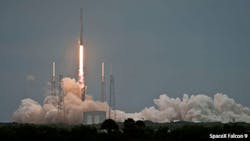SpaceX Sues Air Force, Protests Lack of Competition in Satellite Launch Contracts
WASHINGTON - SpaceX on Friday filed suit against the U.S. Air Force for awarding billions of dollars to a single company for national security launches, and said the contracts might even violate sanctions against Russia.
The U.S. military spends billions yearly with United Launch Alliance, a joint operation of aerospace giants Boeing (IW 500/14) and Lockheed Martin (IW 500/29), to launch government satellites.
The Atlas V and Delta IV rockets are powered by Russian engines, which has raised concern among some lawmakers that such reliance is dangerous in a time of escalating tensions over Ukraine.
"This is not right," SpaceX CEO Elon Musk told reporters, describing the policy of "uncompeted procurement" by the Air Force's Evolved Expendable Launch Vehicle (EELV) program.
"SpaceX has decided to file suit and protest the Air Force EELV block buy," Musk said.
The process "essentially blocks companies like SpaceX from competing for national security launches," said Musk at a press conference.
The suit was filed in federal court, he added.
Musk said ULA rockets cost four times the amount of SpaceX's.
"To add insult to the wound, the primary engine is made in Russia," said Musk.
"The person who heads Russian space activities is [deputy prime minister] Dmitry Rogozin, who is on the sanctions list. So it seems pretty strange, like, you know, how is it that we are sending hundreds of millions of U.S. taxpayer money at a time when Russia is in the process of invading Ukraine?" Musk asked.
Musk: 'Good Probability' of Sanctions Violation
"It would be hard to imagine some way in which Dmitry Rogozin is not benefiting personally from the dollars that are being sent there," he added.
"On the surface of it is seems there is a good probability of some sanctions violation."
An Internet entrepreneur who co-founded PayPal, Musk has gained a high profile in the business world with SpaceX and his electric car company, Tesla.
In 2012, SpaceX's Dragon capsule became the first unmanned spaceship made by a private U.S. company to reach the International Space Station. A version that could carry crew is expected by 2017.
"This is not SpaceX protesting and saying these launches should be awarded to us. We are just protesting and saying these launches should be competed," Musk said.
"If we compete and lose, that's fine."
Test of Reusable Rocket Not Quite Smooth
His California-based firm is also working on a novel rocket called the Falcon 9 reusable that could return to Earth from a space launch intact and be used again and again for space launches.
The latest test of the rocket showed it was able to land upright with all legs deployed, but SpaceX was unable to retrieve it intact from its ocean landing, due to stormy seas and lack of access to a big enough boat, he said.
Still, Musk said he hoped the next ocean test landing would go more smoothly, since it would splash down closer to land.
If that goes well, he said he was "optimistic" that the reusable rocket's first land-test return could happen at Florida's Cape Canaveral later this year.
Copyright Agence France-Presse, 2014
About the Author
Agence France-Presse
Copyright Agence France-Presse, 2002-2025. AFP text, photos, graphics and logos shall not be reproduced, published, broadcast, rewritten for broadcast or publication or redistributed directly or indirectly in any medium. AFP shall not be held liable for any delays, inaccuracies, errors or omissions in any AFP content, or for any actions taken in consequence.
